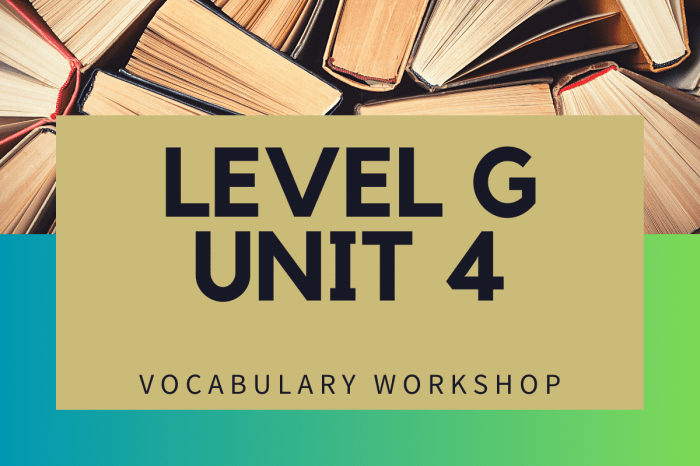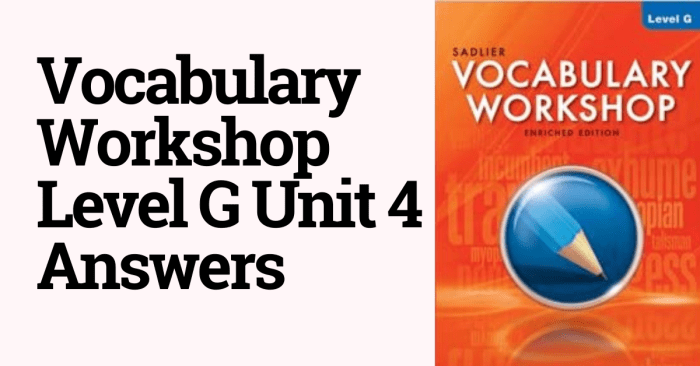Vocabulary Workshop Level G Unit 4 delves into the realm of vocabulary acquisition, offering educators a comprehensive guide to fostering vocabulary development in the classroom. This unit explores effective strategies for expanding vocabulary, the role of word analysis, the importance of contextualized vocabulary, and the integration of technology in vocabulary enhancement.
Through engaging activities, examples, and practical tips, Vocabulary Workshop Level G Unit 4 empowers teachers to create a dynamic and supportive learning environment where students can develop their vocabulary skills, enhance their comprehension, and express themselves effectively.
Vocabulary Acquisition Strategies: Vocabulary Workshop Level G Unit 4

Expanding vocabulary is crucial for effective communication and academic success. Numerous strategies can enhance vocabulary acquisition, including reading widely, engaging in word games, and utilizing flashcards.
Role of Context
Understanding the context in which words are used is essential for acquiring new vocabulary. By examining words in their context, learners can infer their meaning and usage.
Classroom Activities, Vocabulary workshop level g unit 4
- Word of the Day: Introduce a new word each day and provide its definition, pronunciation, and usage.
- Vocabulary Scavenger Hunt: Hide vocabulary words around the classroom and have students search for them.
- Collaborative Word Maps: Students create concept maps connecting new words to familiar concepts.
Word Analysis and Vocabulary Building

Morphological Analysis
Morphological analysis involves examining word structure, including prefixes, suffixes, and root words. By understanding these components, learners can deduce the meaning and relationships between words.
Word Analysis in Practice
- Prefixes: “un-” (not), “re-” (again), “dis-” (opposite)
- Suffixes: “-ment” (action), “-tion” (condition), “-able” (capable)
- Root Words: “scrib” (write), “dict” (speak), “port” (carry)
Teaching Word Analysis
- Explicit Instruction: Teach students about prefixes, suffixes, and root words.
- Word Building Games: Engage students in games where they create new words using word parts.
- Contextualized Examples: Provide examples of how word analysis aids in understanding text.
Vocabulary in Context

Importance of Context
Using vocabulary in meaningful contexts helps learners retain and apply new words. It provides a deeper understanding of how words are used in real-life situations.
Activities for Contextualized Vocabulary
- Storytelling: Have students create stories using new vocabulary words.
- Dialogue Writing: Engage students in dialogues where they use specific vocabulary.
- Vocabulary-Based Discussions: Facilitate discussions where students explore the nuances of vocabulary in different contexts.
Benefits of Contextualized Vocabulary
- Enhanced Retention: Contextualized vocabulary is more easily remembered.
- Improved Application: Learners can apply new words in a variety of contexts.
- Increased Fluency: Contextualized vocabulary promotes smoother and more natural language use.
FAQ Compilation
What is the primary focus of Vocabulary Workshop Level G Unit 4?
Vocabulary Workshop Level G Unit 4 focuses on providing educators with effective strategies and techniques for expanding students’ vocabulary and enhancing their comprehension.
How does Vocabulary Workshop Level G Unit 4 address the challenges faced by English language learners?
Vocabulary Workshop Level G Unit 4 recognizes the specific challenges faced by English language learners in acquiring vocabulary and provides effective strategies and resources tailored to their needs.